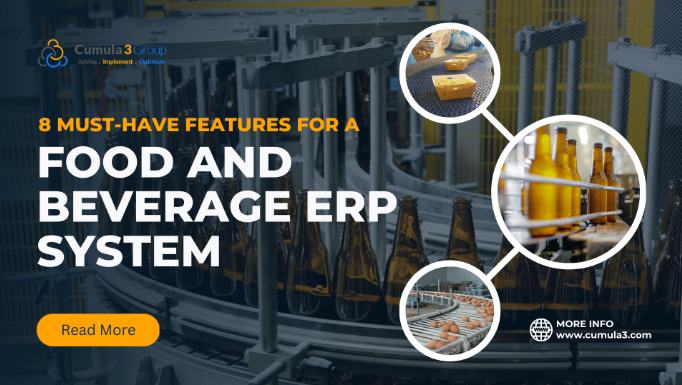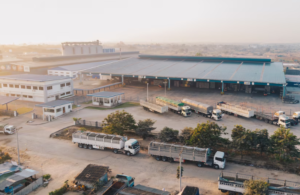Arguably no industry requires end-to-end traceability as much as the Food and Beverage (F&B) sector.
With safety, sanitation, and satisfaction hinging on transparency and visibility at every level, F&B leaders around the world are looking for ways to streamline operations across the supply chain.
Enterprise Resource Planning (ERP) systems, like NetSuite can get them there. Yet, the market is seemingly flooded with vendors promising best-of-breed solutions. How can leaders in this space know which Food and Beverage ERP system will be the best one for their needs?
Today, we’re diving into this question, exploring the industry-specific requirements that F&B leaders must prioritize when researching ERP vendors.
Read on to learn the important ways to set your search up for success.
Why Do Food & Beverage Manufacturers Need an ERP System?
Any standard, out-of-the-box ERP system can help business leaders run financial reports and monitor inventory numbers. Yet, so can any accounting software worth its salt.
What sets these solutions apart is their ability to deliver data-driven insights that drive real business growth across the finance, operations, inventory, and sales department of any F&B company. With this knowledge in hand, managers are better poised to spot both opportunities and obstacles and take action right away.
Moreover, ERP software allows leaders in the F&B sector to keep pace with industry requirements, including:
- Inventory planning, management, and tracking
- Real-time supply chain monitoring and tracing
- Issue identification, reporting, and resolution
- Regulatory food safety compliance
Thus, it’s easy to see why investing in this effort is worth the time, costs and energy. Still, there is no one-size-fits-all when it comes to a quality ERP system. To maximize the return on their investment, industry leaders require one that caters to the F&B crowd, with integrated features that meet the needs and pain points specific to this space.
That said, let’s take a look at the requirements to look for as you begin your search for the best F&B-centric ERP system on the market.
1. Lot Tracking and Full Traceability
Research shows that only 33% of consumers trust the food system strongly and have full confidence that the food they eat is safe.
Thus, there is an impetus on F&B leaders to build and maintain customer trust at every step of their operations.
It’s imperative to look for an ERP system that provides automated, end-to-end traceability at all touchpoints along the supply chain. This way, both industry leaders and grocery shoppers alike can learn as much as possible about ingredients as they travel from farm to fork.
This includes tracking the following data for products and ingredients:
- Lots
- Dates
- Quantities
- Movements
As products move from raw ingredients to finished goods, traceability is an initiative that any public-facing F&B leader should prioritize. This allows interested parties to follow the flow backward to inspect ingredient sources or forward to learn more about product disposition.
2. Detailed Record keeping
According to recent studies, 55% of customers would switch food brands temporarily in the aftermath of a recall. Moreover, 15% said they would never purchase the item in question again and 22% would swear off the impacted manufacturer forever.
Thus, it’s easy to see why the average food manufacturer pays more than $10 million to cover the costs associated with a given recall. That money goes toward activities such as:
- Communicating details of the recall across the supply chain
- Locating, retrieving and safeguarding the recalled item
- Performing an investigation into the event
- Implementing corrective measures to minimize damages and prevent reoccurrence
How can an ERP system assist in these efforts? One with excellent record keeping functionality can make it infinitely easier to pinpoint exactly where in the supply chain the compromise or contamination first occurred.
In addition to lot tracking and tracing, look for one that also helps users maintain thorough documentation to assist with recall preparedness efforts. The shortlist of records to maintain includes:
- Purchase orders
- Labels
- Bills of landing
- Shipping documents
While an F&B manufacturer should also have systemic, in-house measures in place to facilitate recall response, an effective ERP system can make the effort much easier. Ultimately, a quick response can help impacted entities jumpstart their efforts to recoup monetary costs, restore their brand image and rebuild consumer confidence.
3. Recipe Management
Nestle Toll House chocolate chips. Bush’s Baked Beans. Coca-Cola.
There are some iconic food items that have become almost synonymous with their brand due to their unique taste that imitators just can’t seem to replicate, no matter how hard they try.
Do the manufacturers behind these fan favorites simply try their luck at repeating success with every batch? Of course not! They follow a strict, specific recipe to make sure every batch is consistent with the one before it and the one that follows.
Thankfully, ERP systems make it easier than ever before for F&B companies to maintain their time-honored techniques while inventing new products along the way.
To get there, it’s important to look for an ERP system that includes integrated recipe management resources. With these tools, users can record myriad variations of any recipe, keeping track of any changes or updates along the way. The same system can also help manufacturers:
- Store and scale all recipes
- Observe and monitor the recipe development process
- Document manufacturing steps and instructions
- Manage all quality control efforts
As an added benefit, the same resources can aid in inventory management efforts. Users can maintain a real-time recipe list alongside the associated bill of materials (BOM) for each, with details on each recipe’s:
- Physical properties
- Different versions
- Revisions
- Production notes
Of course, users will need to look for an ERP system that includes advanced security features, including user-based role permissions, to ensure only authorized users have access to these confidential, proprietary details!
4. Formula Management
Along with recipe management, ERP systems in the F&B industry should also include tools that help them ensure all food item formulas are correct and consistent.
The two differ in that recipes are sets of ingredients and instructions, while formulas are fixed sets of certain ingredients, categorized by weight and specific processing instructions. To make a given food item, all weights and steps must be standardized across every step of the chain.
Not only can an ERP system help users store and update formulaic instructions, but it can also provide a space to store important nutritional data, including:
- Lists of ingredients
- Specific allergen information
This data is critical to ensure all labeling activities are accurate. It’s also a necessary step in F&B regulatory reporting.
5. Inventory Management
It goes without saying that effective inventory management is a key component of any F&B manufacturer’s ongoing success.
Not only is inventory tracking an important loss prevention tool, but it’s also critical to customer satisfaction. If too few items are in stock, customers become disgruntled while a surplus leads to wasted resources.
What’s needed is a system that can identify and reduce areas of waste, continuously monitor inventory flow, leverage rotation methods and avoid unnecessary overproduction.
An ERP system can help leaders strike this delicate balance, especially if it includes an integrated warehouse management system (WMS) feature.
WMS systems support daily activities that center around planning, maintaining, organizing, staffing, and directing company resources. At any time and from anywhere, they can obtain instant insight into the following data points:
- Inventory numbers
- Specific serial numbers
- Lots
- Product line information
This knowledge helps them keep a close eye on inventory levels, tracking their growth or decline as it occurs.
6. Master Data Management
Another benefit of food manufacturing ERP?
The intricate record keeping that these systems enable makes it easier for industry leaders to respond to regulatory statutes and global requirements that help direct the food industry supply chain.
Companies must develop and maintain different kinds of programs, data, and records that are up-to-date, accurate and accessible in an instant. In addition, any corrections or deviations from the norm must be both validated and verifiable.
How can dedicated F&B leaders keep up with such requirements?
An ERP for food manufacturing takes what used to be a manual process full of spreadsheets and external databases and transforms it into an automated platform. This switch improves and quickens record keeping by a considerable margin.
Now, users can leverage food ERP systems to maintain, update and access records on:
- Processes, equipment, and personnel
- Inspection controls
- Data changes
- Testing procedures
From the U.S. Department of Agriculture (USDA) and the U.S. Food and Drug Administration (FDA) to state regulatory bodies, there are various departments tasked with ensuring that F&B manufacturers are meeting codes and maintaining compliance at every step.
An ERP for the food industry can provide the deep visibility required to meet these stringent demands and avoid penalties down the road.
7. Material Requirement Planning
With an industry-based ERP system, F&B leaders can take their material requirement planning (MRP) efforts to the next level. Knowing which materials are required at any given time is crucial to keeping budgets in check, meeting buyer demand and maintaining adequate stock numbers.
As such, the MRP step combines functions of inventory management with other resources, including,
- Production scheduling
- Material ordering
- Financial management
The result? A comprehensive platform that allows users to create more accurate orders using forecasts, sales projections, inventory levels, and information on product availability.
This step begins with an assessment of each BOM, which details the ingredients and quantities necessary for all production activities. Using the MRP data listed above, users can more accurately calculate which materials are required and when they’ll be used.
This simple process can help them optimize inventory levels, reduce waste, prioritize production, and better respond to shifts in customer demand and preference.
8. Advanced Quality Control
Compared to other industries, F&B leaders are under stricter quality control measures than most. That’s because even the smallest oversight could lead to direct and dire consequences that could pose a threat to public health and tank a brand in minutes.
To meet both company standards and consumer expectations, an effective quality management system is a must. This is another reason why food and beverage ERP systems, like NetSuite provide full forward and backward lot traceability are a necessity.
These allow users to monitor materials in real-time as they travel throughout the production process. In turn, they can track, trace, monitor and report on these details to the following interested bodies:
- Auditors
- Regulatory entities
- Consumers
When coupled with internal quality assurance and control processes, the instant visibility that an ERP system provides can help manufacturers maintain an outstanding industry image.
Performing quality tests on all raw ingredients in every batch ensures that all production runs are as consistent as possible. In the event that any item fails a quality inspection, leaders can initiate quarantine procedures to ensure no other area along the supply chain becomes negatively impacted. Then, they can hold the products without release until all corrective actions are completed.
Many food processing software systems come equipped with both in-production and customer-centric testing, allowing manufacturers to easily generate personalized Certificates of Analysis (CofA) to meet their needs.
Is NetSuite Right for Your F&B Organization?
Are you looking to maximize visibility, improve operational efficiencies and establish a competitive advantage within the food & beverage industry?
If so, you’ve come to the right place. Read how other fast growth companies are making the switch to NetSuite Cloud ERP to accelerate growth.








